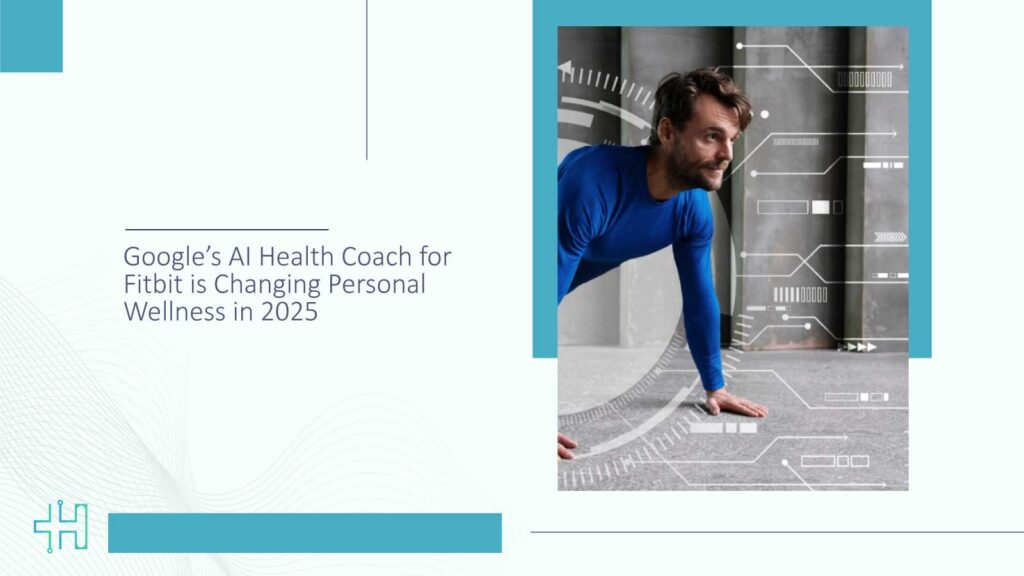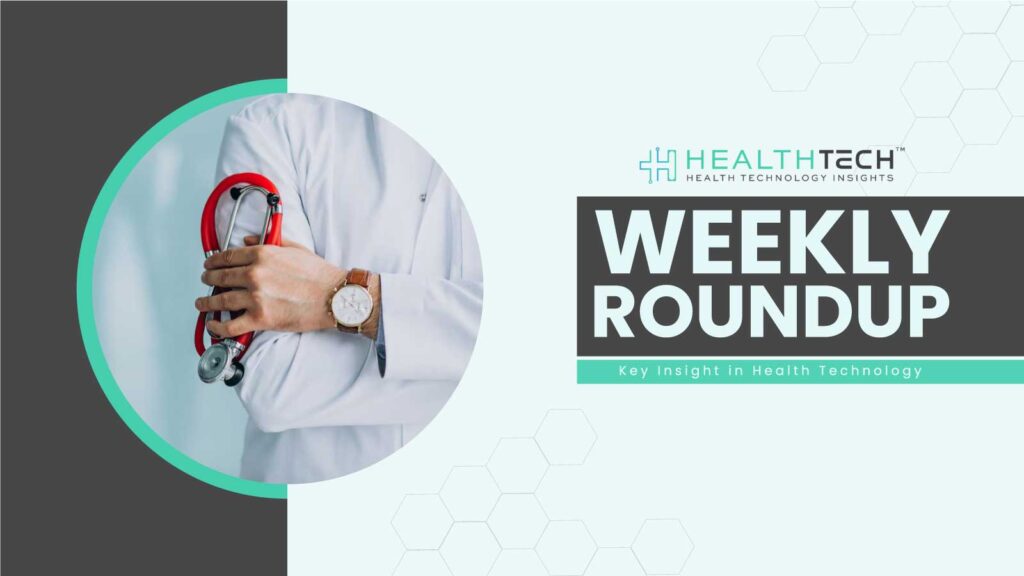Most of us have downloaded a fitness app only to abandon it weeks later. Why? It’s because one-size-fits-all health advice rarely works. What motivates one person may overwhelm another. A 10K training plan looks great on paper, but if you’re exhausted from travel or juggling late-night deadlines, it quickly feels impossible. Launched in 2025, Google’s AI health coach for Fitbit promises to deliver health and wellness coaching that adapts to your life in real time.
It doesn’t just track steps or calories, it learns from your sleep, activity, and lifestyle patterns to give you guidance that feels personal, actionable, and achievable. For industry leaders and health tech professionals, this isn’t just another app launch.
It’s a signal that AI-powered personalization is finally entering the mainstream, with the potential to influence how individuals, employers, and even healthcare systems think about wellness in the years ahead.
The Big Reveal: What Google Announced
Earlier this year, Google announced the integration of its Gemini AI platform into Fitbit, creating what it calls an “AI Health Coach.” Unlike traditional fitness apps that offer static plans, this AI coach is designed to adapt in real time, offering advice that reflects your daily life.
Think about it: instead of just being told to complete a 5K training plan, the AI considers your sleep quality, your heart rate, even whether you’ve been traveling or managing unusual stress at work. It then adjusts your activity recommendations accordingly.
According to TechCrunch (2025), the AI health coach will first roll out to Fitbit Premium subscribers, combining fitness training, nutrition advice, and health education into a unified, conversational platform.
Why It Matters: The Wellness Market in 2025
In the U.S., where lifestyle-related chronic conditions account for the majority of healthcare spending, tools like Google’s AI health coach for Fitbit represent more than just convenience; they represent potential long-term impact on public health.
Dr. Karen DeSalvo, Google’s Chief Health Officer, recently emphasized: “We see AI as a partner that can empower people to make informed decisions about their health, right where they are at home, on the go, or in between busy schedules.”
For health leaders, this isn’t simply about wearable tech. It’s about scalable preventive care that could reduce strain on healthcare systems already pushed to capacity.
Key Features of Google’s AI Health Coach for Fitbit
Gemini’s Nano Banana Upgrade is engineered for professionals who demand precision, consistency, and creative control. From subtle edits to complex transformations, every feature is designed to make image editing smarter, faster, and more reliable. Let’s explore the key capabilities that make this upgrade stand out for pros:
1. Personalized Wellness Plans
The AI coach builds daily and weekly health strategies that take into account multiple data sources, from heart rate and sleep stages to menstrual cycles and activity patterns.
2. Real-Time Adaptability
Plans evolve if your circumstances change. If you slept poorly, the AI may suggest a lighter routine. If you’re traveling, it may recommend stretches that you can do in a hotel room.
3. Integrated Ecosystem
The AI connects seamlessly with Pixel Watches, Fitbit devices, and third-party apps through Health Connect. For healthcare providers, this creates a continuous stream of usable data that can be shared with patient consent.
4. Sleep and Recovery Insights
With an enhanced focus on recovery, the AI coach provides strategies to improve sleep hygiene, one of the most overlooked factors in personal health.
The Human Side: Why This Feels Different
Wellness apps are nothing new. But many users abandon them within months because they feel generic. Google’s AI health coach for Fitbit aims to bridge this gap by creating a sense of conversation.
Imagine waking up to a notification that says: “I noticed your heart rate was elevated last night. Let’s skip the run today and try a gentle yoga flow instead.”
That kind of personalization doesn’t just guide behavior, it builds trust. And trust is the missing ingredient that could make AI coaching a lasting habit instead of a passing trend.
Industry Analysis: What Leaders Need to Know
For healthcare decision-makers, the implications extend beyond consumer fitness. Here’s why:
- Preventive Care at Scale: AI coaches can encourage healthier daily choices, potentially reducing preventable hospital visits.
- Data-Driven Insights: Aggregated, anonymized data could help providers better understand population health trends.
- Employer Adoption: U.S. companies already investing in employee wellness programs may view AI coaching as a cost-effective perk.
- Insurance Models: Insurers may explore discounted premiums for members actively using AI-driven health tools.
McKinsey reports that AI adoption in healthcare could generate $360 billion in annual savings for the U.S. system by 2030, according to McKinsey. Google’s entry into personal wellness through Fitbit positions it squarely in that trajectory.
Balancing Innovation and Responsibility
As exciting as these advancements are, they raise important questions:
- How secure is the health data collected by an AI coach?
- Will AI-generated advice align with evidence-based medicine?
- Could reliance on consumer devices widen the gap between those with access to technology and those without?
- Google has emphasized its commitment to privacy and interoperability, with data processed under strict security frameworks. However, leaders in health tech must continue to monitor how consumer-focused AI solutions intersect with regulated medical care.
A Case in Point: Ambience Healthcare’s Chart Chat
To understand where this ecosystem is heading, consider Ambience Healthcare’s “Chart Chat” integration into Epic’s EHR. It’s an AI tool for clinicians, enabling them to query patient histories in real time.
When viewed together, Ambience’s clinical focus and Google’s consumer focus illustrate a broader trend: AI is weaving into every layer of healthcare, from individual wellness decisions to hospital workflows.
Looking Ahead: What Comes Next
If 2023 was about AI hype and 2024 about early adoption, then 2025 is the year of integration. Google’s AI health coach for Fitbit is one of the clearest signals yet that wellness is shifting from generic advice to personalized, adaptive coaching.
What might the future look like?
- Voice-Activated Health Coaching: Hands-free, conversational guidance integrated into smart homes.
- Preventive Diagnostics: Early detection of health risks through AI pattern recognition.
- Collaborative Care Models: Data shared directly with physicians to align lifestyle coaching with treatment plans.
The next frontier is not more data, but better guidance. And that’s where AI has the potential to shine.
The Future of Personal Health is AI-Powered and Personalized
Personal wellness is no longer just about counting steps or calories. It’s about receiving tailored insights that adapt to your life in real time. Google’s AI health coach for Fitbit is more than a new app; it’s a signal that AI-powered wellness is finally entering the mainstream.
For industry leaders, the challenge now is to ensure these tools remain secure, inclusive, and aligned with clinical standards. For individuals, it’s a chance to experience wellness support that feels personal, relevant, and actionable.
As we move deeper into 2025, one question lingers: if AI can coach us toward better choices each day, could it help shift the entire healthcare system from reactive to preventive?
FAQs
1. What makes Google’s AI Health Coach for Fitbit different from other fitness apps?
Unlike standard apps, it adapts in real time using AI to adjust plans based on sleep, activity, and personal context.
2. Is the AI Health Coach only available to Fitbit users?
Yes, it’s launching first for Fitbit Premium subscribers, but integration with Pixel Watches and other platforms is expected.
3. How does Google protect user health data with this AI tool?
Google processes data under strict security standards, emphasizing privacy, and allows users to control their data-sharing preferences.
4. Can the AI Health Coach replace a doctor or medical advice?
No. It is designed for wellness guidance, not diagnosis or treatment. It complements but does not replace professional medical care.
5. What industries stand to benefit most from this innovation?
Healthcare systems, insurers, and employers could all leverage AI coaching to support preventive health and reduce costs.
Dive deeper into the future of healthcare.
Keep reading on Health Technology Insights.
To participate in our interviews, please write to our HealthTech Media Room at sudipto@intentamplify.com




